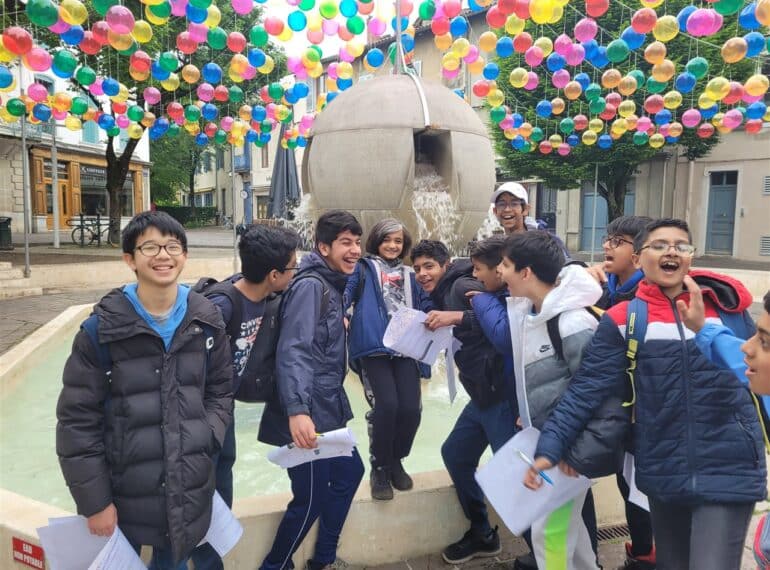
As the School as a whole marks QE’s 450th anniversary, the Languages department has its own landmark to celebrate – ten years of its French exchange.
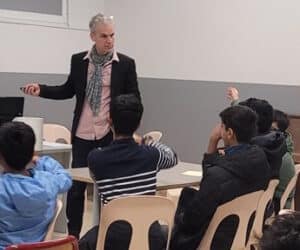 Twenty-one boys headed to Bourg-en-Bresse this month, a town which lies northeast of Lyon at the foot of the Jura Mountains. Their exchange partners came to Barnet last term.
Twenty-one boys headed to Bourg-en-Bresse this month, a town which lies northeast of Lyon at the foot of the Jura Mountains. Their exchange partners came to Barnet last term.
The QE boys enjoyed a week of activities that ranged from trips to local attractions to attending classes in the partner school, Collège St Pierre. This tenth exchange follows a three-year gap because of the pandemic.
Head of Languages Nora Schlatte said: “We were particularly excited for the 2023 French exchange, having not had an exchange run since 2019, and the trip was a great success.
“The QE boys and their French partners got on really well and it was great to see them sharing experiences and speaking more and more French as the week went on. Families on both sides said how happy they were to have been able to take part in this experience and we are thrilled to be maintaining our strong link with Collège St Pierre.”
 The first exchange with Bourg-en-Bresse was in the 2010 Summer Term, when 13 pupils from Years 8 and 9 visited Collège St-Pierre, the alma mater of a QE French teacher of the time, Océane Jullien, who now teaches in Thailand.
The first exchange with Bourg-en-Bresse was in the 2010 Summer Term, when 13 pupils from Years 8 and 9 visited Collège St-Pierre, the alma mater of a QE French teacher of the time, Océane Jullien, who now teaches in Thailand.
On this year’s trip the QE boys flew in to Geneva and then took a coach over the border to Bourg-en-Bresse, where they were met by the host families. They were accompanied by Ms Schlatte, Languages teacher Katrin Hood (who is also Head of Year 8) and Cover Supervisor Joan Anderson.
Their busy week included a:
 Visit to the local ‘parc des oiseaux’ (bird park) with their partners
Visit to the local ‘parc des oiseaux’ (bird park) with their partners- Day trip to Lyon, taking in a museum visit (Musée du Cinéma et de la Miniature), picnic lunch, shopping and a funicular railway ride to the cathedral, where they could enjoy the views from the hill
- Weekend spent with the families – activities reported include bowling, trips to the cinema, cave visits, and visits to the Chamonix mountain region
- Scavenger hunt through the town and a woodland adventure activity
- Day in school, taking part in a quiz, and, with their exchange partners, in an Art lesson, Mathematics lesson, PE activity and going to a basketball match in the evening
- Trip to the market.
Among the QE party was Dhruva Arjun, who said: “My highlight was watching the basketball match on the last night. The atmosphere was really fun and it was great to be there with our exchange partners.”
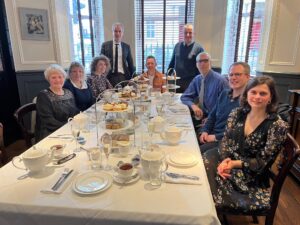 Fellow member of Harrisons’ House, Aaryav Sharma, said some of his most memorable moments took place above ground level: “We had a great afternoon doing accrobranche, which is a treetop adventure activity,” adding that he and two friends all “managed the really difficult black run, which was great!”
Fellow member of Harrisons’ House, Aaryav Sharma, said some of his most memorable moments took place above ground level: “We had a great afternoon doing accrobranche, which is a treetop adventure activity,” adding that he and two friends all “managed the really difficult black run, which was great!”
Tanish Nori, a member of Underne House, relished spending time with his partner and the family. “At the weekend, they took me to the Alps and we went to the Aiguille du Midi, which was amazing.”
Last term, Headmaster Neil Enright joined key staff involved in the exchange in celebrating a decade of successful trips with a special afternoon tea.

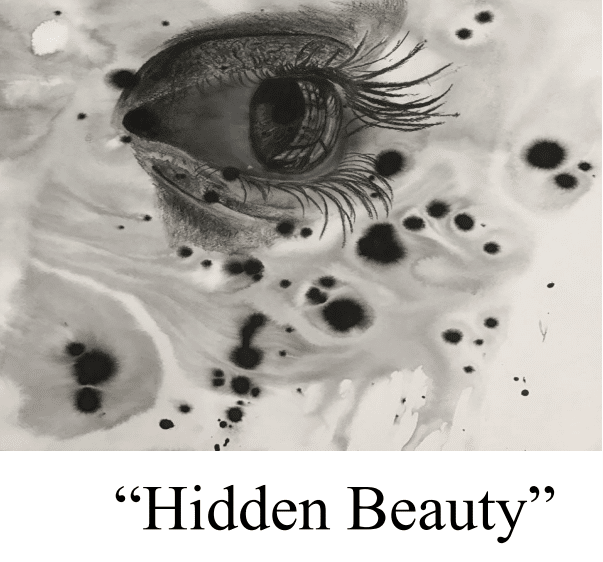
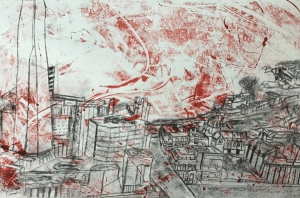
 Six artists’ work is featured, including the front-cover illustration by Year 13’s Dylan Domb, pictured top, and pieces by Gabriel Gulliford (also Year 13), above right, and Year 12’s Pratham Bhavsar, left.
Six artists’ work is featured, including the front-cover illustration by Year 13’s Dylan Domb, pictured top, and pieces by Gabriel Gulliford (also Year 13), above right, and Year 12’s Pratham Bhavsar, left.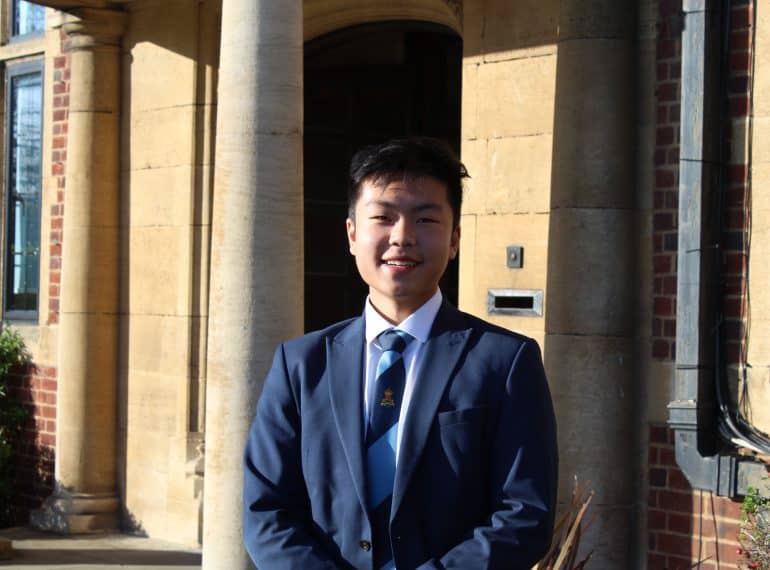
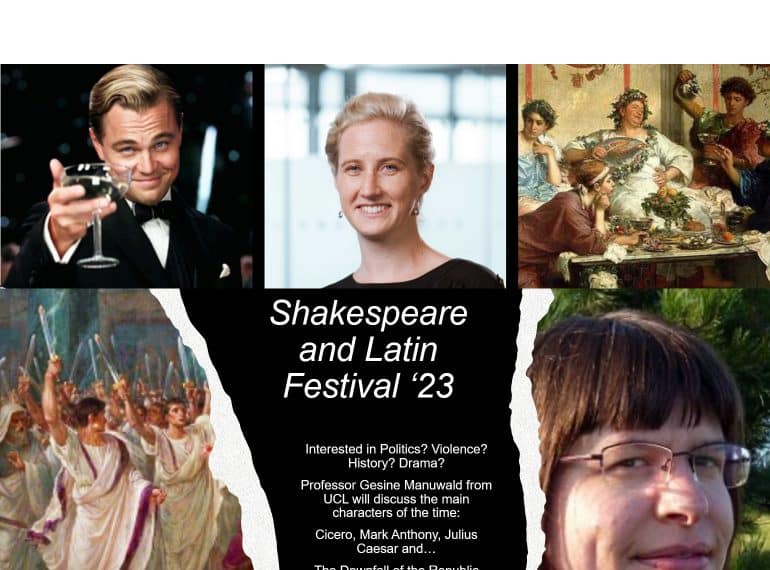
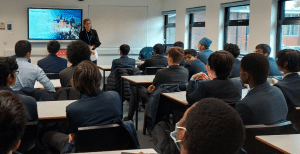 The School re-introduced Latin as a full curriculum subject in 2012, and all boys opting to study more than one language at GCSE are invited to take classes in Ancient Greek. The announcement follows QE’s inaugural Shakespeare and Latin Festival, which got under way towards the end of the Autumn Term.
The School re-introduced Latin as a full curriculum subject in 2012, and all boys opting to study more than one language at GCSE are invited to take classes in Ancient Greek. The announcement follows QE’s inaugural Shakespeare and Latin Festival, which got under way towards the end of the Autumn Term. The announcement of QE’s new role is one of a series of recent announcements from external organisations which have further underlined QE’s academic credentials. Earlier this month, the influential Sunday Times Parent Power survey confirmed that this year’s QE A-level results were the best of any state school in the country. Before that, Schools Minister Nick Gibb wrote to Mr Enright to congratulate the School on its “leadership in continuing to promote the teaching of languages”. All 191 boys in last year’s Year 11 were entered for at least one modern foreign language GCSE – a 100% rate which puts QE “amongst the top schools in England for the proportion of pupils studying a language at GCSE”, Mr Gibb wrote.
The announcement of QE’s new role is one of a series of recent announcements from external organisations which have further underlined QE’s academic credentials. Earlier this month, the influential Sunday Times Parent Power survey confirmed that this year’s QE A-level results were the best of any state school in the country. Before that, Schools Minister Nick Gibb wrote to Mr Enright to congratulate the School on its “leadership in continuing to promote the teaching of languages”. All 191 boys in last year’s Year 11 were entered for at least one modern foreign language GCSE – a 100% rate which puts QE “amongst the top schools in England for the proportion of pupils studying a language at GCSE”, Mr Gibb wrote.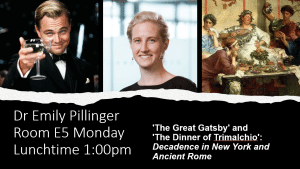 In her lecture delivered at the School, Dr Emily Pillinger, Senior Lecturer in Latin Language and Literature at King’s, looked at Decadence in New York and Ancient Rome. Her well-attended talk was open to senior Latinists and English Literature GCSE and A-level students. “Dr Pillinger drew out the links between Baz Luhrmann’s film of The Great Gatsby, Fitzgerald’s novel and the ancient Latin text, The Feast of Trimalchio,” said Mr Bonham-Carter.
In her lecture delivered at the School, Dr Emily Pillinger, Senior Lecturer in Latin Language and Literature at King’s, looked at Decadence in New York and Ancient Rome. Her well-attended talk was open to senior Latinists and English Literature GCSE and A-level students. “Dr Pillinger drew out the links between Baz Luhrmann’s film of The Great Gatsby, Fitzgerald’s novel and the ancient Latin text, The Feast of Trimalchio,” said Mr Bonham-Carter.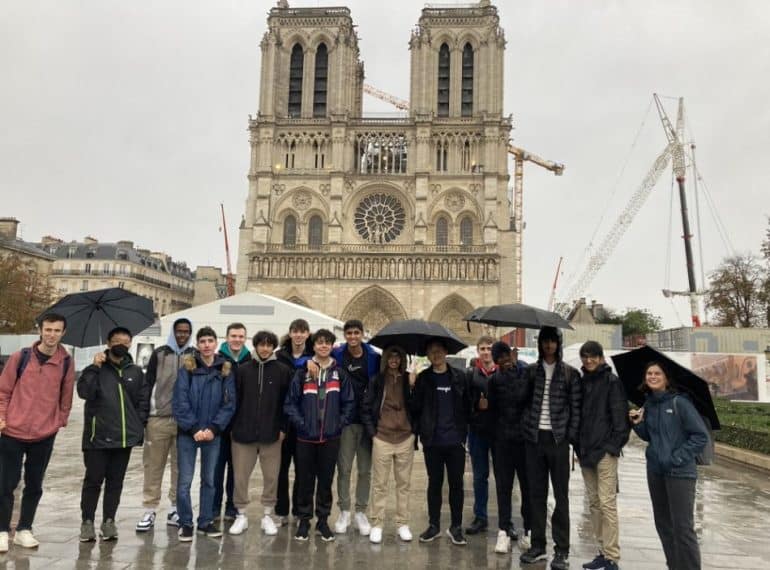
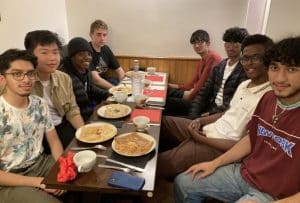 Moving around on public transport, the boys took in the sights and used local specialist guides who spoke to them in French.
Moving around on public transport, the boys took in the sights and used local specialist guides who spoke to them in French. 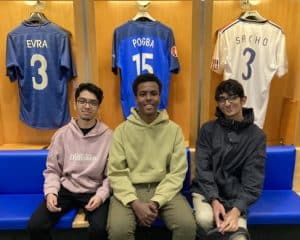 Amongst the highlights for the boys were the evening boat trip and the tour of the Stade de France. Shuaib Adam, of Year 12, said: “Seeing the Eiffel Tower in person on the first night had me in awe, let alone a cruise along the River Seine watching the Eiffel Tower light show.”
Amongst the highlights for the boys were the evening boat trip and the tour of the Stade de France. Shuaib Adam, of Year 12, said: “Seeing the Eiffel Tower in person on the first night had me in awe, let alone a cruise along the River Seine watching the Eiffel Tower light show.”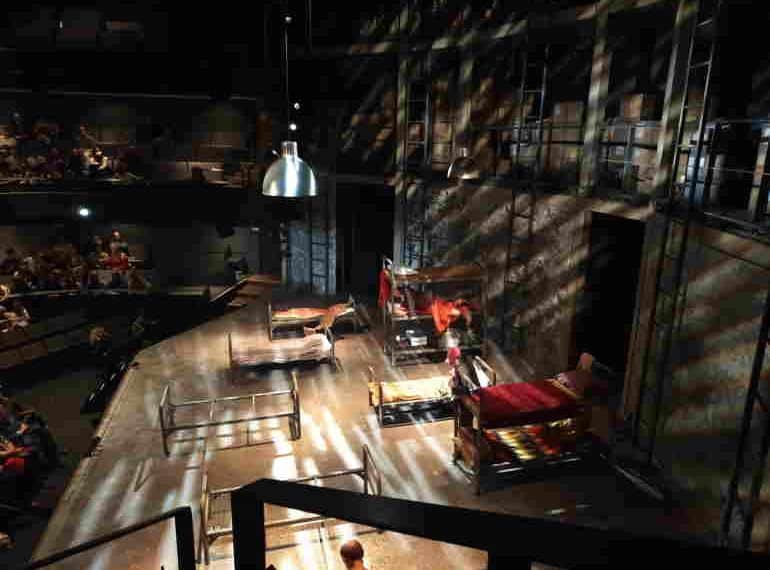
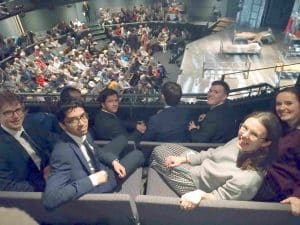 The group of Year 12 and Year 13 German students took the train to Kingston to watch The Caucasian Chalk Circle (Der kaukasische Kreidekreis) in the town’s Rose Theatre.
The group of Year 12 and Year 13 German students took the train to Kingston to watch The Caucasian Chalk Circle (Der kaukasische Kreidekreis) in the town’s Rose Theatre.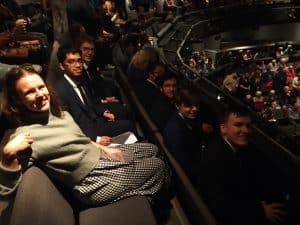 The visit reinforced the boys’ Sixth Form German studies. The Sixth Form course covers Berlin and its cultural scene. Brecht lived and worked in East Berlin for a large part of his career, although The Caucasian Chalk Circle was written in the United States, where Brecht was living in exile during the war.
The visit reinforced the boys’ Sixth Form German studies. The Sixth Form course covers Berlin and its cultural scene. Brecht lived and worked in East Berlin for a large part of his career, although The Caucasian Chalk Circle was written in the United States, where Brecht was living in exile during the war.